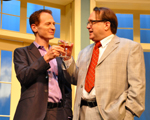To hear Harry Reasoner report the death of Ernest Hemingway on CBS Radio, go here.
Radio has changed a lot since 1961, hasn’t it?
Archives for July 2011
TT: Salute!
John Philip Sousa introduces a 1931 performance of “The Stars and Stripes Forever,” played by Sousa’s Band and conducted by the composer:
TT: In lieu of the real thing…
…Robert Casadesus plays Debussy’s “Fireworks”:
TT: Almanac
“A man who loves humanity and ignores patriotism is ignoring humanity.”
G.K. Chesterton, “The Patriotic Idea”
FILM
House Calls. If the situation calls for pure entertainment and you’re at a loss, go for Howard Zieff’s 1978 romcom about a widowed doctor who decides to play the field but ends up falling for a prickly middle-aged lady with a kid and no money. Walter Matthau and Glenda Jackson strike sparks galore, and Art Carney and Richard Benjamin provide sterling support. The witty script is credited to a gaggle of pros, among them Julius J. Epstein, the co-author of Casablanca, and Max Shulman, the creator of Dobie Gillis. Whoever did what, the results are fluffy and fine (TT).
ORIGINAL-CAST ALBUM
Guys and Dolls (Decca Broadway). If you can’t make it up to the Berkshires to see Barrington Stage’s revival of Frank Loesser’s masterpiece, then grab the CD version of the original-cast album. George S. Kaufman’s still-celebrated 1950 Broadway production is gone with the wind and the movie version was lousy, but the hard-nosed punch of the singing of Robert Alda, Isabel Bigley, Vivian Blaine, and Stubby Kaye was preserved for all time by Decca, complete with George Bassman’s delectably brassy orchestrations. Accept no substitutes! (TT)
JAZZ
Gene Bertoncini (Bar Henry, 90 W. Houston St., 646-448-4559, Mondays at 7:30-10:30). After a distressingly long hiatus caused by the closing of Le Madeleine three years ago, the great jazz guitarist now has another regular New York gig. If you don’t know Bertoncini’s playing, go here and marvel at the liquid tone and supple romanticism of his solo style. Then go to Bar Henry and hear him in person–often (TT).
TT: Up the down staircase
I report in today’s Wall Street Journal on Pittsburgh Irish and Classical Theatre’s production of Alan Ayckbourn’s House & Garden. Here’s an excerpt.
* * *
When is a stunt not really a stunt? When it’s dreamed up by Alan Ayckbourn. In addition to being the most prolific playwright of modern times, Mr. Ayckbourn is also a master of ingenuity, as New York audiences discovered two years ago when London’s Old Vic brought its revival of “The Norman Conquests” to Broadway. But “The Norman Conquests,” three interlocking plays set in different parts of the same country house on a single weekend, is far more than just a piece of consummate cleverness. So is “House & Garden,” a 1999 diptych consisting of two plays that take place simultaneously in the sitting room and garden of the same house and are designed to be performed in adjacent theaters by the same cast, with the actors racing from stage to stage as needed. (Only the audiences stay put.)
 “House & Garden” is a high-speed whirligig of theatrical trickery, but as always with Mr. Ayckbourn, there’s more to it than that. In between the riotous farce-style sequences, he paints a bleak portrait of the dilapidated state of modern marriage as seen through the eyes of two unhappy couples, and the funnier the jokes, the darker the shadows. It makes for an impressive package–but one that can only be performed by a company that has access to two stages on the same site.
“House & Garden” is a high-speed whirligig of theatrical trickery, but as always with Mr. Ayckbourn, there’s more to it than that. In between the riotous farce-style sequences, he paints a bleak portrait of the dilapidated state of modern marriage as seen through the eyes of two unhappy couples, and the funnier the jokes, the darker the shadows. It makes for an impressive package–but one that can only be performed by a company that has access to two stages on the same site.
That’s where Pittsburgh Irish and Classical Theatre comes in. Founded in 1996, PICT operates out of the University of Pittsburgh’s Stephen Foster Memorial, a purpose-built theatrical complex that looks like a Gothic-style church. It contains two houses, the 454-seat Charity Randall Theatre and 153-seat Henry Heymann Theatre, that are connected by a backstage spiral staircase, making it possible for PICT to mount “House & Garden” with relative ease. Just because you can do something doesn’t mean you should, but PICT has taken the measure of “House & Garden” and put together a cast whose members are equal to the challenge of conveying its technical and emotional complexities….
* * *
Read the whole thing here.
